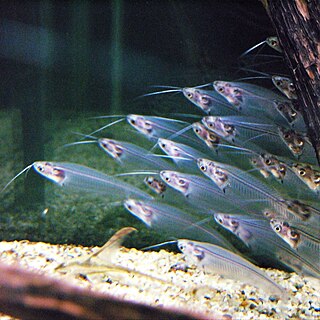
Akysis is the largest genus of catfishes of the family Akysidae.

Kryptopterus is a genus of catfishes belonging to the family Siluridae. They are found in freshwater throughout Southeast Asia. The scientific name comes from Ancient Greek kryptós + ptéryx. It refers to the reduced or even entirely absent dorsal fin of these catfishes.

Chaca is the only genus in the catfish family Chacidae. These fish are commonly known as squarehead catfishes, frogmouth catfishes, or angler catfishes. These unusual fish have a sedentary lifestyle and spend much of their time motionless.

Batasio is a genus of catfish of the family Bagridae. These small fish are found in fast-flowing hillstreams throughout South and mainland Southeast Asia.

Bagrichthys is a genus of bagrid catfishes.

Hemibagrus is a genus of catfishes of the family Bagridae.
Pseudomystus is a genus of catfishes of the family Bagridae.
Helicophagus is a genus of shark catfishes native to Southeast Asia.
Gogo is a small genus of catfishes of the family Anchariidae. It includes four species.

Bagarius is an Asian genus of catfishes of the family Sisoridae. It includes five to six extant species and potentially one extinct fossil species, B. gigas.

Glyptosternon is a genus of sisorid catfishes native to Asia.
Parakysis is a genus of catfishes of the family Akysidae. It includes six species.
Pseudobagarius is a genus of catfishes of the family Akysidae.

Silurichthys is a genus of sheatfishes native to Asia.
Ompok is a genus of fish in the family Siluridae found in lakes and large rivers throughout South and Southeast Asia.

Belodontichthys is a genus of sheatfishes native to Asia.
Pterocryptis is a genus of sheatfish. These fish are medium-sized catfishes usually found in fast flowing mountain streams throughout India, southern China and Southeast Asia. There are two cavefish species in the genus, P. buccata and P. cucphuongensis.
Hyalobagrus flavus is a species of bagrid catfish endemic to Indonesia where it is known only from the Batang Hari drainage in Sumatra and the Mentaya River basin in southern Borneo where it inhabits brown water habitats that are closely associated with blackwater peat swamps. They occur in large shoals, sometimes mixed with other species of shoaling catfish such as Pseudeutropius brachypopterus and P. moolengurghae.
Hyalobagrus leiacanthus is a species of bagrid catfish endemic to Indonesia where it is known only from the Kapuas River and the Barito River basins in central Borneo.

Hyalobagrus ornatus is a species of bagrid catfish found in Indonesia, Malaysia and Thailand. It is found in the Muar River drainage in the southern Malay Peninsula of Malaysia and Thailand and Kapuas basin in western Borneo. It occurs in streams and peat swamps.











